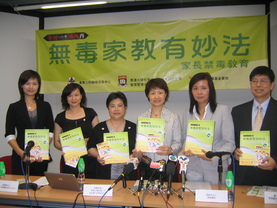Fight drugs parent education resource kit
One of the recommendations of the Task Force on Youth Drug Abuse is to enhance parental education on drug prevention. To implement the recommendation, the Beat Drugs Fund has sponsored the production of a new anti-drug resource kit for parents, which was launched on June 24.
The resource kit is jointly produced by the Department of Social Work and Social Administration of the University of Hong Kong and the Tung Wah Group of Hospitals CROSS Centre, in consultation with the Action Committee Against Narcotics and other stakeholders including parents and social workers.
Speaking at the briefing session, the Commissioner for Narcotics, Ms Sally Wong, said, “Parents are important in the prevention of drug abuse and in helping children who have gone astray to reintegrate into the society. The new anti-drug resource kit for parents provides tips on parenting knowledge, attitudes and skills to prevent drug abuse by children of different background. The resource kit comes with a leaflet to help parents understand the key points and seek assistance.
“The resource kit also provides reference materials for other Government departments, parent-teacher associations, schools and non-governmental organisations to plan and organise anti-drug activities and modules for parents and train-the-trainers programmes.”
The resource kit comprises four booklets. The first booklet introduces the rationale behind the design and the usage guidelines. The other three booklets set out a variety of anti-drug programmes targeting different types of parents, including parents whose children have no drugs related behaviour; parents with at-risk children and parents who have taken or are taking illicit drugs themselves.
Except for the first booklet, each booklet contains two sections. The first section proposes activities for parents to facilitate intervention at different levels. The activities include those for individuals, small groups and large-scale events. For individuals, “tips” in sample cases were used to introduce the skills in handling different scenarios. For small groups, detailed activities are proposed in a programme. “Highly recommended activities” with key messages are highlighted in the kit to help users grasp the key points of the programme. The kit also highlights certain important learning and teaching points.
The kit also contains a CD ROM and has a website. The CD ROM contains all the resources required for the activities such as information sheet, question cards, slides and record forms for small group activities, etc.
The resource kit has been uploaded onto two websites, namely http://www.parentedu-fightdrug.org/ and www.nd.gov.hk Users can download the videos recommended for use in the activities and browse the latest anti-drug information.
Moreover, to help users with different needs to use the resource kit, information on the training programmes for use of the resource kit and other anti-drug activities is also listed in the website. Members of the public are welcome to join the programmes.
The Department of Social Work and Social Administration, the University of Hong Kong and the Tung Wah Group of Hospitals CROSS Centre will organise talks for parents and parent-teachers associations in 18 districts across the territory. They will organise “train-the-trainers” workshops for social workers, teachers and peer counsellors from July to October this year to encourage them to use the resource kit and organise more training programmes to promote the engagement of parents in the anti-drug cause.
(From right) Mr. LAM Kwok Keung, Chief School Development Officer (Sham Shui Po), Education Bureau, Ms Shirley Marie Therese Loo, MH, JP, Chairman of the Working Group on Anti-drug resource kit for parents, Narcotics Division, Security Bureau, Ms Sally WONG, The Commissioner for Narcotics, Dr. Sandra TSANG, Head, Department of Social Work and Social Administration, The University of Hong Kong, Ms. CHUNG Yin Ting, Supervisor, Cross Centre, TWGHs and Ms. CHAU Wai Man, Lajo, S(Y), Social Welfare Department showing the anti-drug resource kit at the briefing session.




